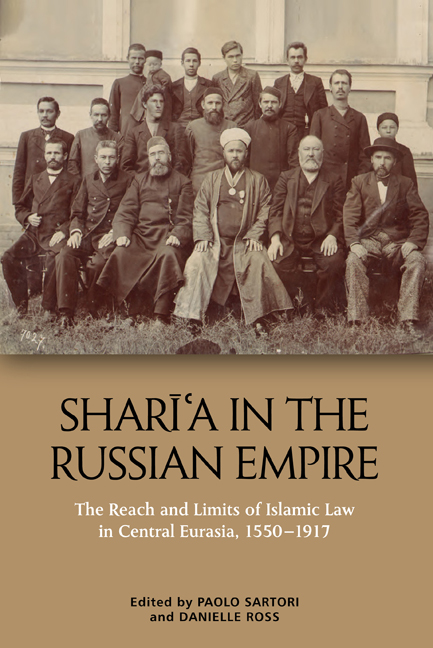Book contents
- Frontmatter
- Contents
- List of Contributors
- Introduction: The Reach and Limits of Sharīʿa in the Russian Empire, c.1552–1917
- 1 Islamic Education for All: Technological Change, Popular Literacy and the Transformation of the Volga-Ural Madrasa, 1650s–1910s
- 2 Taqlīd and Discontinuity: The Transformation of Islamic Legal Authority in the Volga-Ural Region
- 3 Debunking the ‘Unfortunate Girl’ Paradigm: Volga-Ural Muslim Women’s Knowledge Culture and its Transformation across the Long Nineteenth Century
- 4 Between Imperial Law and Islamic Law: Muslim Subjects and the Legality of Remarriage in Nineteenth-century Russia
- 5 Islamic Scholars among the Kereys of Northern Kazakhstan, 1680–1850
- 6 Tinkering with Codification in the Kazakh Steppe: ʿĀdat and Sharīʿa in the Work of Efim Osmolovskii
- 7 Taqlīd and Ijtihād over the Centuries: The Debates on Islamic Legal Theory in Daghestan, 1700s–1920s
- 8 Kunta Ḥājjī and the Stolen Horse
- 9 What We Talk about When We Talk about Taqlīd in Russian Central Asia
- 10 Take Me to Khiva: Sharīʿa as Governance in the Oasis of Khorezm (Nineteenth Century–Early Twentieth)
- Index
5 - Islamic Scholars among the Kereys of Northern Kazakhstan, 1680–1850
Published online by Cambridge University Press: 22 September 2020
- Frontmatter
- Contents
- List of Contributors
- Introduction: The Reach and Limits of Sharīʿa in the Russian Empire, c.1552–1917
- 1 Islamic Education for All: Technological Change, Popular Literacy and the Transformation of the Volga-Ural Madrasa, 1650s–1910s
- 2 Taqlīd and Discontinuity: The Transformation of Islamic Legal Authority in the Volga-Ural Region
- 3 Debunking the ‘Unfortunate Girl’ Paradigm: Volga-Ural Muslim Women’s Knowledge Culture and its Transformation across the Long Nineteenth Century
- 4 Between Imperial Law and Islamic Law: Muslim Subjects and the Legality of Remarriage in Nineteenth-century Russia
- 5 Islamic Scholars among the Kereys of Northern Kazakhstan, 1680–1850
- 6 Tinkering with Codification in the Kazakh Steppe: ʿĀdat and Sharīʿa in the Work of Efim Osmolovskii
- 7 Taqlīd and Ijtihād over the Centuries: The Debates on Islamic Legal Theory in Daghestan, 1700s–1920s
- 8 Kunta Ḥājjī and the Stolen Horse
- 9 What We Talk about When We Talk about Taqlīd in Russian Central Asia
- 10 Take Me to Khiva: Sharīʿa as Governance in the Oasis of Khorezm (Nineteenth Century–Early Twentieth)
- Index
Summary
Introduction
A number of preconceptions regarding nomadic religiosity and Islam have strongly affected our understanding of the ʿulamāʾ among Qazaq nomads. These ideas are evident in much of the Russian writing on Qazaq history, and commonly maintain that Qazaqs, while nominally Muslims, did not constitute the same sort of Muslim society as their sedentary neighbours in the Volga-Ural region and Central Asia because they did not share the same sort of emotional or social attachment to Islam. Qazaqs were often described as ‘shamanists’ and their lack of immediately recognis¬able Islamic institutions, such as mosques and madrasas, was further evidence of their ‘superficial’ devotion to Islam. According to much of this Russian writing, ‘pre-Islamic’ customary law defined Qazaq legal culture, and sharīʿa was an invasive species of law brought by outsiders, specifically Tatars and Central Asians. Qazaqs who administered custom¬ary law – biys – were understood to be secular tribal chieftains whose authority and homespun wisdom were similarly ‘pre-Islamic’, and, in any event, unpolluted by Islamic education. Furthermore, these scholars argue, Qazaq nomads, as ‘shamanists’, had no Islamic scholars of their own, and instead brought in (or were supplied with) Islamic scholars from their more recognisable Islamic neighbours in Russia and Central Asia to administer Islamic Law.
Such a view reveals a substantial inability to assess Qazaq social history on its own terms. But it retains considerable currency in much of the scholarship on Qazaq history, particularly scholarship that is mainly derived from Russian sources, and not least in Kazakhstan itself.
At the same time, Qazaqs, including members of the ʿulamāʾ who examined the history of their own Islamic institutions, frequently assert the nearly total absence of Islamic scholars among Qazaq nomads up until about 1830. For example, writing in Russian periodicals in 1881, B. Daulbaev asserts that before 1830 there were virtually no ‘mullahs’ among the Qarabalïq Qïpshaqs in Torghay oblast’. Muhammad-Salih Babadzhanov, writing in 1861, made a similar observation regarding the Qazaqs of the Inner Horde. The Bukhara-trained poet and scholar Mäshhür Zhüsĭp Köpeyŭlï (1857–1931) and the theologian and historian Saduaqas Ghïlmani (1890–1972) wrote in manuscript works that the first Islamic scholars did not appear among the Arghïns of the Pavlodar and Aqmola (Akmolinsk) regions until the 1830s.
- Type
- Chapter
- Information
- Shari'a in the Russian EmpireThe Reach and Limits of Islamic Law in Central Eurasia, 1550-1917, pp. 183 - 208Publisher: Edinburgh University PressPrint publication year: 2020



